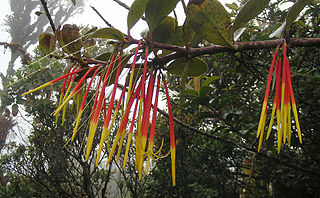
Manilkara is a genus of trees in the family Sapotaceae. They are widespread in tropical and semitropical locations, in Africa, Madagascar, Asia, Australia, and Latin America, as well as various islands in the Pacific and in the Caribbean. A close relative is the genus Pouteria.

The genus of the myrrhs, Commiphora, is the most species-rich genus of flowering plants in the frankincense and myrrh family, Burseraceae. The genus contains approximately 190 species of shrubs and trees, which are distributed throughout the (sub-) tropical regions of Africa, the western Indian Ocean islands, the Arabian Peninsula, India, and South America. The genus is drought-tolerant and common throughout the xerophytic scrub, seasonally dry tropical forests, and woodlands of these regions.

Tapinanthus is a genus of mistletoe in the family Loranthaceae, native to Africa. The name of the genus is derived from the Greek tapeinos meaning "low" or "humble" and anthos meaning flower.

Agelanthus is a genus of Afrotropical plants in family Loranthaceae. They grow in trees, including Acacia and Combretum species, as hemiparasitic shrubs of varying sizes. The host plant is penetrated by a single haustorium, and the stems typically have swollen, flower-producing nodes. The flowers are often closely clustered (fascicled) with the five petals (pentamerous) fused into a tube (gamopetalous). The flower may have a swollen base and the tubes open along unilateral, V-shaped splits. The filaments remain spirally rolled inward when the flowers open, while the styles are inconspicuous, slender filaments that are somewhat thickened in the middle. Berries range from pink to orange and red in colour, and are around 1 cm in diameter.
Agelanthus kayseri is a species of hemiparasitic plant in the family Loranthaceae, which is native to Kenya, Tanzania and Somalia.
Agelanthus keilii is a species of hemiparasitic plant in the family Loranthaceae, which is native to Rwanda, Tanzania and Burundi.
Agelanthus myrsinifolius is a species of hemiparasitic plant in the family Loranthaceae, which is native to Rwanda, Zaire and Burundi.
Oliverella is a genus of flowering plants belonging to the family Loranthaceae.
Walter Carl Otto Busse was a German botanist, whose primary scholarly focus was on German agriculture and the plants, fungi and lichen of Africa.

Actinanthella is a small genus of hemiparasitic shrubs in the Loranthaceae family. They are found in Sub-Saharan Africa, specifically in Mozambique, Zambia, and Zimbabwe.
Vanwykia is a genus of flowering plants belonging to the family Loranthaceae.
Spragueanella is a genus of flowering plants belonging to the family Loranthaceae.

Aetanthus is a genus of flowering plants belonging to the family Loranthaceae.
Erianthemum is a genus of flowering plants belonging to the family Loranthaceae.
Oncocalyx is a genus of flowering plants belonging to the family Loranthaceae.

Plicosepalus is a genus of hemiparasitic flowering plants belonging to the family Loranthaceae.
Globimetula is a genus of flowering plants belonging to the family Loranthaceae.
Oedina is a genus of flowering plants belonging to the family Loranthaceae.
Oncella is a genus of flowering plants belonging to the family Loranthaceae.






